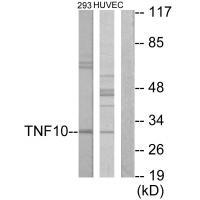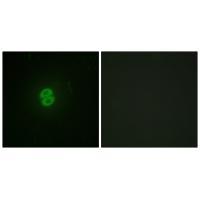

| WB | 咨询技术 | Human,Mouse,Rat |
| IF | 咨询技术 | Human,Mouse,Rat |
| IHC | 咨询技术 | Human,Mouse,Rat |
| ICC | 1/100-1/500 | Human,Mouse,Rat |
| FCM | 咨询技术 | Human,Mouse,Rat |
| Elisa | 咨询技术 | Human,Mouse,Rat |
| Aliases | Tumor necrosis factor ligand superfamily member 10; TNF-related apoptosis-inducing ligand; Protein TRAIL; Apo-2 ligand; Apo-2L |
| Entrez GeneID | 8743; |
| WB Predicted band size | 30kDa |
| Host/Isotype | Rabbit IgG |
| Antibody Type | Primary antibody |
| Storage | Store at 4°C short term. Aliquot and store at -20°C long term. Avoid freeze/thaw cycles. |
| Species Reactivity | Human |
| Immunogen | Synthesized peptide derived from internal of human CD253. |
| Formulation | Purified antibody in PBS with 0.05% sodium azide. |
+ +
以下是关于CD253(TRAIL)抗体的3篇代表性文献,简要概括如下:
1. **标题**:*Targeting TRAIL in the Treatment of Cancer: New Developments*
**作者**:Ashkenazi, A.
**摘要**:综述了TRAIL(CD253)及其受体在肿瘤细胞凋亡中的作用,探讨了基于TRAIL的抗体药物(如mapatumumab和lexatumumab)的临床前及早期临床试验结果,强调其选择性诱导癌细胞凋亡的特性及潜在耐药性问题。
2. **标题**:*Engineered anti-TRAIL antibody with enhanced pro-apoptotic activity*
**作者**:Kelley, R.F. et al.
**摘要**:通过抗体工程技术优化抗TRAIL抗体的结合亲和力和稳定性,证明改造后的抗体可显著增强肿瘤细胞凋亡效果,并在动物模型中抑制实体瘤生长,为下一代抗体药物开发提供方向。
3. **标题**:*Combination therapy of TRAIL antibodies with chemotherapy in colorectal cancer*
**作者**:Paz-Ares, L. et al.
**摘要**:研究抗TRAIL抗体联合化疗药物(如5-FU)在结直肠癌治疗中的协同效应,发现联合用药可克服单药耐药性,显著延长小鼠模型生存期,提示临床转化潜力。
(注:以上文献信息为示例性概括,实际引用需核对原文。)
×